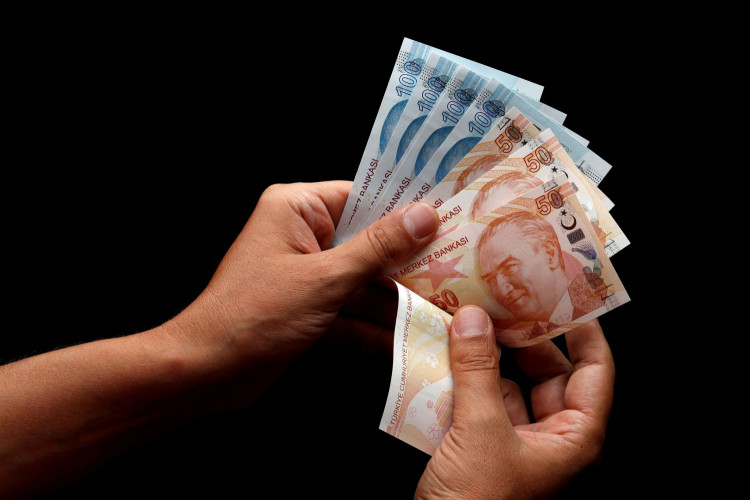Turkey's Central Bank took a shift in its monetary policy on Thursday, raising interest rates by 650 basis points from 8.5% to 15% in its first hike since March 2021. However, the increase was not as substantial as the market had anticipated, and the Lira fell sharply by 4% as a result.
The Central Bank hinted at further tightening, expressing the committee's resolve to start a process of monetary tightening to bring inflation down swiftly, stabilize inflation expectations and control the deterioration of pricing behavior. The bank also indicated it would continue to tighten monetary conditions progressively as required until there is a significant improvement in inflation outlook.
Despite the indication of a new policy trajectory, the magnitude of the rate increase fell short of market expectations, which median forecast from economists was around 20%. Some analysts had predicted the rate could potentially double, triple or even quadruple.
With the current inflation rate in Turkey standing at a staggering 39%, the country experienced a shocking peak of 80% inflation at one point in 2022. Calls have been made by investors and economists alike for the Central Bank to raise the interest rate above the country's inflation rate.
The disappointing rate increase on Thursday sent the Lira plummeting 4%, resulting in a historical high of 24.5 against the US dollar. The Lira has depreciated by about 80% against the dollar over the past five years. Turkey's government bonds also fell on the same day.
Previously, President Erdogan opposed high interest rates, insisting that they exacerbate rather than curb inflation. He had expressed his desire for the country's central bank to bring rates to a single-digit level, resulting in Turkey's unconventional approach to battling inflation with rate cuts.
In February of this year, the Central Bank cut rates by 50 basis points to 8.5%, stating that the monetary policy stance was adequate to support necessary recovery after an earthquake, while closely monitoring the effects of supply-demand imbalances caused by the earthquake on inflation.
The recent elections in Turkey have resulted in a turning point in the country's monetary policy. In May, President Erdogan was re-elected, despite a tough race triggered by a cost-of-living crisis and the effects of an earthquake. Following his re-election, Erdogan reshuffled his cabinet and replaced the head of the central bank and the finance minister.
This month, Erdogan appointed Hafize Gaye Erkan, a former senior executive at First Republic Bank and a Princeton graduate who previously worked at Goldman Sachs, as the new central bank governor. This move hinted at a potential shift away from Turkey's unorthodox economic policies that have caused economic instability and prompted foreign investors to withdraw.
Critics have argued that Erdogan's credit-driven growth has unbalanced the economy, even as he tried to alleviate the imbalance through regulations and financial plans. The policies have also depleted the country's foreign exchange reserves and lowered the standard of living for Turkish people.
Turkey's foreign exchange reserves have been depleting rapidly in recent years due to frequent market interventions to boost the Lira and other efforts to cool foreign exchange demand. The net foreign exchange reserves of the Turkish Central Bank fell into negative territory for the first time since 2002 to meet Erdogan's call for "hard currency demand ahead of the decisive vote," standing at -$1.513 billion as of May 19.
In early June, Turkey reduced its protective measures for the Lira, a move welcomed by investors as a shift toward more sustainable policies. However, most of the country's foreign exchange reserves are borrowed, with the central bank using currency swap agreements to exchange dollars and other currencies for liras within a specific period with domestic banks and foreign governments. Excluding these swaps, Turkey's foreign exchange reserves stand at a negative $60 billion.
Some analysts have questioned the duration of the current rate hike cycle and its ability to control inflation expectations, calling this a "dovish rate hike." They predict that the pressure on the Turkish Lira will continue.
Others believe that the country is slowly reverting to orthodox economic policies and may continue to raise interest rates within the year. Some support the Central Bank's cautious move, arguing that aggressive rate hikes could slow the economy too quickly and inadvertently trigger a debt crisis.
Some see the cautious rate hike by the new central bank governor as an attempt to avoid conflict with Erdogan, who has previously fired central bank governors for hiking rates within a few months of their appointment.
On the same day, Turkish Finance Minister Mehmet Simsek stated that economic policies would remain sustainable. He affirmed that a stable and credible Lira is the most effective solution to combat dollarization, and that they will implement market economy and free exchange rate system policies, which will bring a large influx of capital.






